Kelli Stanley reading from City of Dragons
May 26, 2010 by David
Filed under AuthorsVoices
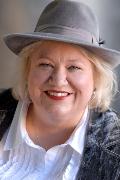 978-0312-60360-1 – Hardcover – Minotaur – $24.99 (also available as an e-book at $11.99)
978-0312-60360-1 – Hardcover – Minotaur – $24.99 (also available as an e-book at $11.99)
Writerscast is proud to present the second in our series of authors reading from their work called AuthorsVoices. I hope you will agree that hearing these works read aloud, especially by the original authors, will add greatly to the experience of the writing and the authors’ distinct sense of their own words. With writers touring for books less frequently now, these podcasts should provide readers with an opportunity to hear some of our best contemporary authors reading from, and sometimes performing their own works.
Kelli Stanley’s City of Dragons is a great noir mystery novel with a great woman detective main character. The novel is set in Stanley’s meticulously recreated 1940’s era San Francisco that she plainly deeply loves. I read this book a few months ago, thought it was terrific, and interviewed Kelli (here). For AuthorsVoices Kelli provides an introduction to the book and does a terrific reading of Chapter 1 of her novel in full. Note to listeners: language in this piece does include some words not allowed on broadcast radio or television.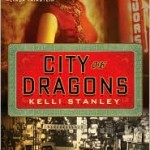
Podcast: Play in new window | Download
Alice Lichtenstein: Lost: A Novel
May 24, 2010 by David
Filed under Fiction, WritersCast
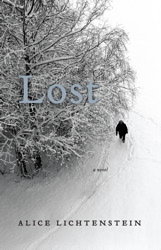 978-1439159828 – Scribner – Hardcover – $24.00 (also available as an e-book)
978-1439159828 – Scribner – Hardcover – $24.00 (also available as an e-book)
Some books are painful but must be read; the suffering of the characters we identify , endured, the story absorbed into one’s bones. I found that to be the case with Lost: A Novel by Alice Lichtenstein. This story operates on a number of levels, as a good novel should. Its three main characters are “lost” but each in different ways. And unlike the television show of the same name (I wonder how that congruency affects the potential readership of this novel?), the core of the story is not hidden away from us, the literal losses in this novel are by far not the deepest pain the characters endure, nor we the readers with them.
But don’t get wrong, this is not a novel so full of pain that it drives you away, or causes you to wonder why you are there. It’s not a book that is simply devoted to misery, and certainly not the kind of suffering that drives us away from the book or its characters. I was immediately drawn into the story, attracted to the characters, especially Susan, whose husband suffers from acute dementia, and has walked away into the winter, and Christopher, whose wife has left him. Their losses and their relationship is at the heart of the novel, and will ultimately unite them in redemption. I really liked the carefully woven web which connects the three key characters and the various subplots that eventually lead into the fullness of the novel.
And this is definitely a novel of winter in a cold country, which ironically provides much of the heat of the story. The coldness in the book is palpable – the author does live in and deeply feels the north country; she describes the cold like a native.
As much as I enjoyed the novel, I also very much enjoyed talking to the author, Alice Lichtenstein. In our conversation, we explored the complexity of the novel and her characters’ desires, their connections and the meaning of their losses. This is a book I recommend to friends, and an author whom I think has alot to say about human life and emotion, and importantly, who writes really well. Plus she is a good conversationalist. It’s not that easy a combination to find. 
Podcast: Play in new window | Download
Joanna Smith Rakoff: A Fortunate Age
April 22, 2010 by David
Filed under Fiction, WritersCast
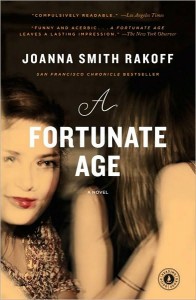 978-1416590804 – Paperback – Scribner – $15.00
978-1416590804 – Paperback – Scribner – $15.00
Joanna Smith Rakoff is a wonderful writer – she’s a poet and an essayist, and her skill as a writer shines throughout her novel A Fortunate Age. This was not a book I expected to enjoy as much as I did; Rakoff won me over with the details of her sprawling story, and her characters, whom I similarly did not expect to like so much. The book is modeled directly on Mary McCarthy’s now classic, The Group, whose characters were Vassar women, in a story set in the 1930s and 1940s, whereas Rakoff’s characters are all friends from Oberlin, living in New York City in the late 1990s and the early years of the new century.
Like the novel Rakoff used for inspiration, this is a complicated story with a number of characters told over a number of years. This novel is set mostly in New York City with flashbacks to her characters’ earlier lives, especially their time in college in Oberlin, and some side stories as well. Essentially, it’s a coming of age story, and based on the supposition, I think, that for so many of us, the decade crossing from our twenties to our early thirties truly marks the painful bridge from still youthful adulthood to “real” life. It’s not an easy transition, and for many has the sense of hyper-focused reality that makes it all the more powerful for those experiencing it.
In talking with Joanna, I wanted to explore her interest in Mary McCarthy and her novel that A Fortunate Age is based on (and The Group is also a book I recommend to modern readers, it is a book that is probably more neglected than it should be). Joanna talks about the striking similarities she felt between the lives of her own age group and that of McCarthy’s and how that led her to write her own book. We also talked about the way her book is imagined and how through fiction she worked to represent a particular time and place, a milieu that she evokes through this story, the breadth of her characters and their individual linked stories. As she points out, this novel is, for her almost Victorian in the way its characters function against and within an overall cultural structure toward understanding their social being. There is alot going on in her book, which Rakoff manages quite masterfully, and her ability to handle complexity of story and persona shines in this interview as well. I’m certainly looking forward to reading her next book and to talking to her again.
Podcast: Play in new window | Download
Katharine Weber: True Confections
April 15, 2010 by David
Filed under Fiction, WritersCast
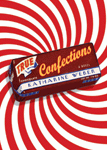 978-0307395863 – Hardcover – Shaye Areheart Books – $22.00
978-0307395863 – Hardcover – Shaye Areheart Books – $22.00
What a fun (and challenging) book! Any novel that takes place in my favorite city, New Haven, Connecticut, is a book I will want to read. And I did really enjoy reading this book. Katharine Weber has created a wonderful main character, the complicated and challenging Alice Tatnall Ziplinsky, who has married into the family that runs the famous Zip’s Candy Company. True Confections is her story, and through her, it is also the story of an immigrant family in America, the romance of candy, family secrets, and the complexity of relationships. Because the entire story is told by Alice, we don’t ever quite know what is real and what is not, and we are forced to confront actual meaning of narrative.
So it turns out that this this funny, warm, and sometimes poignant novel masks an underlying depth of transposed loves, where family becomes defined by relationship rather than blood. In fact, almost every important character in the book has to deal with displacement. It’s great to read a book with depth and complexity. As the author says: “… at its heart, True Confections is about timeless and universal themes: love, betrayal, and of course, sweets.” I should also add that fire – of the destructive kind – also plays an important role in this story, so it’s not all about the sugar.
I enjoyed the opportunity to interview Katharine Weber about the novel, her characters, and of course, New Haven, where she lives, and where this novel is set. The book is rich in subjects and so is our discussion; we talked extensively about her novel, New Haven, the unreliability of narrators, candy, Jewish families and their businesses, and of course, candy. True Confections is a terrific novel; Katharine Weber is a fine writer who also knows how to talk engagingly about her work.
Podcast: Play in new window | Download
Karl Marlantes: Matterhorn: A Novel of the Vietnam War
April 10, 2010 by David
Filed under Fiction, WritersCast
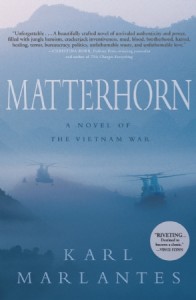 978-0802119285 – Hardcover – Grove/Atlantic – $24.95 (e-book edition available).
978-0802119285 – Hardcover – Grove/Atlantic – $24.95 (e-book edition available).
When I started reading books and interviewing authors for Writerscast, I made a commitment to only interviewing writers whose books I liked. In the year since, I’ve started quite a few I could not finish, but have read and liked a good fifty books of all different kinds. Several of them kept me up well past my already late bedtime, which is always a great feeling, even if it does make me tired.
I have to say that Matterhorn: A Novel of the Vietnam War, at 590 pages, kept me up later and longer than any book I have read in the past year. It’s just impossible to put down. Karl Marlantes takes you right into the psyche of a young, smart, scared Marine lieutenant, landing in ‘Nam for his first tour of duty early in the war, and keeps you with him and the soldiers he fights and dies with all the way through to the end of the book. There’s no doubt that the war in Vietnam was an unforgettable, painful, and highly charged experience for the men and women who were there.
Most of us who are old enough either to have been there, or to have lived through the war at home, have had difficulty finding a voice for what happened, and there has been precious little fiction to come out of that period in America’s history that has resonated as great art. I believe this book qualifies as such a thing. Marlantes has captured so much of what America was in the mid-to-late sixties, it becomes possible to inhabit that world, and most importantly, to understand it. Fiction transforms experience into transcendent understanding; a greater truth emerges. Through the terrible grind of war, the intensity of combat, individual heroism and pain, Marlantes has created a great work of art that celebrates the human spirit, a brilliantly glowing prism of suffering and soul.
Karl Marlantes went to Yale, was a Rhodes Scholar, and like his main character, was a Marine infantry officer in Vietnam where he was awarded the Navy Cross, the Bronze Star, two Navy Commendation Medals for valor, two Purple Hearts, and ten air medals. He wrote Matterhorn over a long period of time – 35 years at least – in many drafts and many forms. At various times, he attempted to have the novel published commercially, but it was never “the right time” for any publisher, until the tiny El Leon Literary Arts agreed to publish earlier this year. When they submitted the novel to Barnes & Noble’s Discover New Authors series, and the book was read by that company’s fiction buyer, Sessalee Hensley, who knew that this book would need a larger publisher to help bring it to the large audience it deserves.
Morgan Entrekin (whom I interviewed for Publishing Talks a few weeks ago and who told me about this book when I talked to him) brilliantly chose to put the full resources of Grove/Atlantic behind this book, and I believe it will end up being recognized as one of the great war novels America has produced. In our conversation, Karl Marlantes tells the story of his life and how this book came to be written, what it took to write it, and what it means for him now that it has been published. He is a terrific writer, and one who well deserves the accolades he and his novel are receiving now.
Podcast: Play in new window | Download
Derrick Jensen: Lives Less Valuable
April 4, 2010 by David
Filed under Fiction, WritersCast
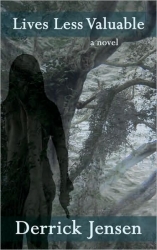 978-1-60486-045-0 – paperback – Flashpoint Press/PM Press – $18.00
978-1-60486-045-0 – paperback – Flashpoint Press/PM Press – $18.00
Derrick Jensen is one of the most intelligent nonfiction writers around. His intellectual ability, brilliant writing and passionate voice for nature, for the powerless (not just people, but our fellow plant and animal species), and for the wounded, have made him a hero for many who oppose the structures of modern society. I was not familiar with his fiction before reading Lives Less Valuable. It’s very difficult to write fiction with a political message, but Jensen succeeds here. Even though the reader knows there is a political subtext, the story and the characters work well, they’re both believable and instructive.
The story centers on Malia, an environmental activist in a modern city where people are dying from a toxic river. The corporation that is at the root of the problem does everything possible to maximize its profits and does not care about the environmental cost borne by the poor people of the city. She is drawn into a complex web of events that forces her to make choices about her beliefs and what she must do to make meaningful change, and when she does, the effects of her choices resonate through the lives of many others. And they do make a difference.
Talking to Derrick Jensen was a great experience for me. He has so much to say about human beings, our relationship to nature, and the meaning of political action, not to mention writing and story telling. In this interview he talked about many subjects, including the nature of activism, the difference between writing fiction and nonfiction, and the details of the writing of this book. He’s as eloquent and brilliant a speaker as he is a writer. Derrick Jensen truly is one of our great public intellectuals. Please note that this interview is longer than usual at 32 minutes, but should reward the listener with a worthwhile experience.
Podcast: Play in new window | Download
E.M. Broner: The Red Squad
March 28, 2010 by David
Filed under Fiction, WritersCast
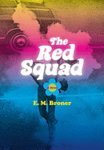 978-0307-37791-3 – Hardcover – Pantheon – $24.00 (also available as an e-book; a paperback edition will be out in July 2010 – 978-0307-45584-0 – $15.00)
978-0307-37791-3 – Hardcover – Pantheon – $24.00 (also available as an e-book; a paperback edition will be out in July 2010 – 978-0307-45584-0 – $15.00)
This is a sometimes hilarious, always engaging, warm and sexy novel about a group of midwestern academics from the sixties, told from the vantage point of Anka Pappas, who, forty years after this fraught period in her life, finds out the entire group was under surveillance by the federal, state and local governments. The story weaves together past and present, as Anka reconnects with her friends and associates – much drama, emotion, and memory unfolds, demonstrating that the past is not at all a dead or forgotten issue. It’s a complicated story that Ms. Broner tells quite skillfully, keeping alot of balls in the air (it does help to have a cast of characters in the front of the book to which the reader can refer, as there is alot of perspective changing going on, sometimes at very high speed).
Broner knows that the political engagement of the sixties and early seventies can not be seen as an isolated period. It is deeply connected to our present. And through this book, she shows us that the issues that engaged the young activists of that earlier period are still with us today. The power relationships in our society ultimately have not been changed; there is much work to be done, and much more engaged life to be lived.
There’s no preaching here, this is a book written by a smart, accomplished writer, who knows how to make a story work, and who clearly had a great time writing this book. Talking to Esther Broner about the book was alot of fun for me. In this interview, she talks about this book and how it relates to her own life. We talk about politics, the nature of fiction and nonfiction, memoir and story, reality and imagination, appearance and reality, and of course the connection between the activism of the 1960’s and how it relates to us today.
This is an enjoyable, funny book that carries a powerful political and emotional punch, written by a skilled and experienced author whose work deserves a wide audience.
Podcast: Play in new window | Download
Mary Sharratt: Daughters of the Witching Hill
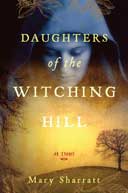
978-0547069678 – Hardcover – Houghton Mifflin Harcourt – $24.00
I really enjoyed reading this book and came to admire its author, not only for her writing skills, which are very good indeed, but because she was able to so deeply and movingly inhabit her characters in a place and time so foreign from our own. Mary Sharratt’s novel is transcendent in many ways. It centers around the years leading up to the 1612 Lancashire, England, witch trials that resulted in the executions of nine supposed witches. Mary Sharratt has brilliantly imagined her story, in which witchcraft is real, albeit not evil in the way the accusers made out. It’s much more complicated – in fact this witchcraft is the folk medicine and healing power of the local spirits of pre-Christian England. Never preachy, Sharratt gives us a countryside where politics and money separate people from one another, and crushing poverty is the lot of so many.
Widowed mother Bess Southerns supports her family and friends by healing the sick, telling fortunes, and blessing those facing misfortune, conjuring charmes that combine forbidden Catholic ritual, medicinal herbs, and guidance provided by her spirit-friend, Tibb. Bess is always careful, knowing the dangers her powers create for her but eventually everything unravels in a series of events that finally gets Bess, her family, friends and supporters into inevitable trouble with the law. Sharratt has crafted a beautiful historical novel that brings this era to life and gives its people she writes about a deep and complex life that many will find surprising. The conflicts between religions, as well as the conflicts between class are here, as well as mystery and suffering and beauty too. The book is set in the English countryside where the author, an American, currently lives. It’s clear to me that Mary Sharratt has allowed this place to inhabit her, as much as she it. She has put together a beautifully crafted story, full of complexity and compelling characters, and even knowing how the book must end, I was hooked from beginning to end.
As a reader I was transported there with her, and found her story uplifting, painful, and beautiful all at the same time. This is a wonderful book.
In my interview with Mary, we talked about her experience as an American living in the English countryside, and how she came to write this book. We talked about the story itself, her characters, their lives, the nature of English witchcraft of the 16th century, power and politics and the warp and weave of her excellent story.
Podcast: Play in new window | Download
Dolen Perkins-Valdez: Wench
March 4, 2010 by David
Filed under Fiction, WritersCast
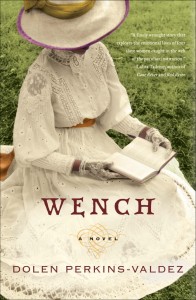 978-0061706547 – Hardcover – Amistad/HarperCollins – $24.99
978-0061706547 – Hardcover – Amistad/HarperCollins – $24.99
Dolen Perkins-Valdez’ first novel, Wench, just blew me away. The writing is beautiful, and the story is compelling. Perkins-Valdez has been able to imagine her characters in a very difficult time, in very difficult circumstances, capturing their pain and suffering as well as their joys, and the complexity of life lived by humans. No stick figures here, male or female, black or white. The author is sympathetic in the strongest sense of that word – she understands people. She does not excuse anything, but she is able to imagine who they are, and therefore her readers are given no excuses either. Here’s the story of the book (I took this from the author’s own website, which is one of the better author websites I have seen recently):
In 1851, a lawyer named Elias P. Drake purchased a plot of land near Xenia, Ohio with the intent to establish a summer vacation resort where the country’s elite could relax and enjoy the mineral springs in the area. At the time, it was believed that natural water could cure illnesses and bring about good health. What made this resort unusual, however, was that it became a popular vacation destination for southern slaveholders and their enslaved mistresses. Ultimately, these flagrantly open relationships offended the northern abolitionists who also frequented the resort. After four years, the resort closed.
This part of the story has been confirmed by historians. I took this forgotten historical note and sketched in a fictional account of what it would have been like to be an enslaved woman traveling to this free state each summer. Why wouldn’t the women try to escape? What kinds of emotional attachments did they have with these men? Initially, I believed that it was entirely possible that they actually loved the men. Ultimately, I discovered that it was much more complicated than that.
Situated in the free state of Ohio, Tawawa House offers respite from the summer heat. A beautiful, inviting house surrounded by a dozen private cottages, the resort is favored by wealthy Southern white men who vacation there, accompanied by their enslaved mistresses.
Regular visitors Lizzie, Reenie, and Sweet have forged an enduring friendship. They look forward to their annual reunion and the opportunity it affords them to talk over the changes in their lives and their respective plantations. The subject of freedom is never spoken aloud until the red-maned, spirited Mawu arrives and voices her determination to escape. To run is to leave behind the friends and families trapped at home. For some, it also means tearing the strong emotional and psychological ties that bind them to their masters.
When a fire on the resort sets off a string of tragedies, Lizzie, Reenie, and Sweet soon learn tragic lessons,that triumph and dehumanization are inseparable and that love exists even in the cruelest circumstances as they bear witness to the end of an era.
That’s the bare bones of the story. Obviously, you need to read this book to understand how good it is. And do listen to this interview. In it, Dolen talks about how she became a writer, how this book came about, how she feels about her characters, and a great deal more. Dolen Perkins-Valdez is a writer who deserves our attention. I’m very much looking forward to her next book, and hoping she will be writing many more after that.
As an aside, the cover is beautiful, and perfect for this book, and has a sort of subliminal effect on me, which maybe contributed subtly to how much I liked reading this book and talking to its author.
Podcast: Play in new window | Download
Kelli Stanley: City of Dragons
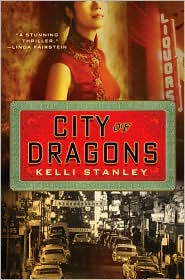
978-0312603601 – Hardcover – Thomas Dunne/Minotaur Books – $24.99
Reading Kelli Stanley’s City of Dragons was a pleasure from beginning to end. I liked her incredible attention to details in the San Francisco of the 1940s setting. I really liked her main character, the wounded private eye, Miranda Corbie. Kelli’s love of noir fiction, and love for a great story really show. Good fiction should be able to take you into another place and time coupling the author’s skills with your own imagination. This book certainly succeeds in grabbing you early, and keeping your attention. Anyone who has read and loved the great classic detective novels will feel at home with Kelli Stanley’s writing. And she has that political edge that so many writers of the 30s and 40s brought to their work.
There’s a lot going on here. You can feel San Francisco in the dark of pre-World War II, taste the cigarettes and booze, and feel the very real danger her characters experience, the otherness of Chinatown, and the deaths and broken lives that dot this sometimes harsh and painful cityscape. And you can feel throughout how much heart and soul the author has put into this book. It’s a pleasure to read, and has a story that won’t let go. Lots of fun overall, and City of Dragons works on many levels, so it will satisfy readers looking for entertainment or something with a bit more depth as well.
Kelli loves her work and loves to talk about it too, so we had a great conversation. This is a writer with a great future and I am very much looking forward to her next book. I’m also hoping to get her to contribute a reading from this novel to Writerscast in the near future. Kelli’s own website is worth a visit as well. City of Dragons is available as an e-book in various formats, and in digital audio as well.
Podcast: Play in new window | Download
